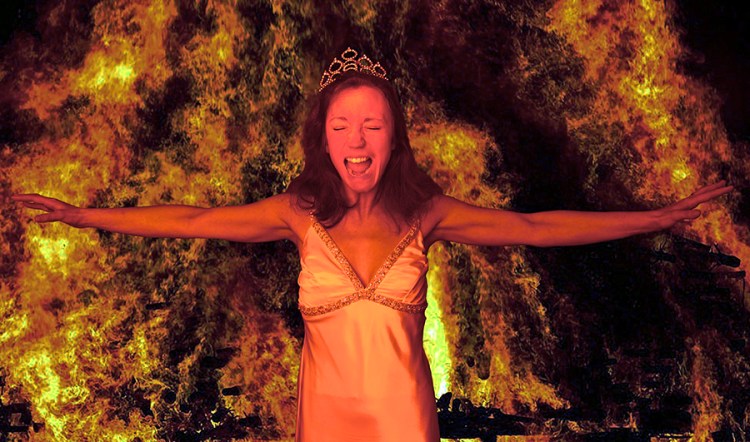Carrie, the girl at the center of Stephen King’s tale of a high school prom for the ages, is back in her home state.
The Gore/Pitchford/Cohen musical theater version of the 1974 King novel set in Maine has had a couple of incarnations before reaching its current form. In his program notes for this Lyric Music Theater production, director Joshua Chard refers to it as an “out-of-the-box show.” Full of high-energy song and dance plus, of course, a few special effects, the show makes for an impressive package of entertainment with a message.
The classic story of the girl who, already limited by her mother’s extreme beliefs, finds her high school peers to be less than welcoming, resonates with issues of child abuse, bullying, school violence and more. For all its heavy subject matter, though, this show makes for a thoroughly engaging two hours of thrills, chills and soaring melodies.
A standout in Lyric’s “Little Women” from last season, Shannon Oliver returns to center stage in the title role. A sympathetic mouse who will eventually roar, Oliver sings with dramatic flair in both solo and duet numbers.

Shannon Oliver as Carrie
Her work opposite Laura Hurd Whited, playing her repressive mother, was particularly effective at the performance under review, as Carrie seeks to emerge into womanhood with the help of an arranged prom date and the unfortunate acquisition of telekinetic powers. The conservatory-trained Whited’s singing also conveyed the treacherous emotional gap between intentions and consequences that is an important motif of this show.
Carrie’s oppressors, led by Alex Jeffrey as the unrelenting Chris, combine adolescent anxiety, peer pressuring and briefly sketched backstories into song and dance numbers that allow each distinctive personality to emerge.
Jericah Potvin, as the more sympathetic Sue, finds liberation through romance with the sensitive Tommy, played by Michael Jenkins. Their duets establish a warmth that is almost enough to encompass and rescue Carrie.

Shannon Oliver as Carrie, shown here with Michael Jenkins as Tommy Ross, sings with dramatic flair in both solo and duet numbers.
Adults, played by Ian Ashland and Lindsey Miller, also try to make a positive difference, with the latter adding to the impressive number of fine singing voices in the ensemble.
Rock-based musical accompaniment under the direction of Bob Gauthier and social-dance oriented choreography provided by Jamie Lupien Swenson help to bring the show into the 21st century, as do the costumes by Cindy Kerr. The angular set by Steve Lupien is kept fresh with varied lighting by Bruce Gray.
Of course, the denouement of the show, set off by strobe lighting and anguished cries, is not a happy one. For that, credit goes again to Mr. King.
Steve Feeney is a freelance writer who lives in Portland.
Send questions/comments to the editors.


